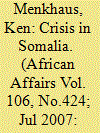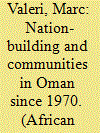|
|
|
Sort Order |
|
|
|
Items / Page
|
|
|
|
|
|
|
| Srl | Item |
| 1 |
ID:
078568


|
|
|
|
|
| Publication |
2007.
|
| Summary/Abstract |
Black Economic Empowerment (BEE) is an attempt to marry redistributive and neo-liberal economic policies. The South African state, however, has differing degrees of power to force redistribution on different sectors of the economy. Fisheries is one of the sectors where state allocation of licenses, exploitation rights and quotas makes the prospects for BEE promising. In this article, we examine redistributive processes in the hake trawl industry. We conclude that BEE, despite its redistributive intentions, has been doubly conducive to the interests of large-scale South African capital. To begin with, it has by and large confirmed the historical share of fishing rights to incumbent, largely white-controlled, operators. Second, it has created a layer of 'black captains of industry' to whom incumbents are increasingly outsourcing primary production in a volatile, high-risk and currently loss-leading sector. While fishing operations are being outsourced under the banner of redistribution, the fish trade remains under the effective control of white capital.
|
|
|
|
|
|
|
|
|
|
|
|
|
|
|
|
| 2 |
ID:
078565


|
|
|
|
|
| Publication |
2007.
|
| Summary/Abstract |
Somalia's catastrophic humanitarian crisis of 2007, in which up to 300,000 Mogadishu residents were displaced in fighting pitting Ethiopian and Transitional Federal Government (TFG) forces against a complex insurgency of clan and Islamist opposition, was the culmination of a series of political miscalculations and misjudgements on the part of Somali and external actors since 2004. They resulted in a cascading sequence of political crises which plunged Somalia into increasingly intractable conflicts. This 'tragedy in five acts' includes the flawed creation of the TFG in late 2004, which emerged as a narrow coalition rather than a government of national unity; the failure of a promising civic movement in Mogadishu in summer of 2005 to challenge the power base of warlords and Islamists in the capital; the disastrous decision by the US government to encourage an alliance between its local counter-terrorism partners in Mogadishu, producing a war which led to the victory of the Council of Islamic Courts (CIC) in June 2006; the radicalization of the CIC over the course of 2006, which guaranteed a war with Ethiopia; and the Ethiopian offensive against the CIC in late 2006, leading to its occupation of the capital, a complex insurgency against Ethiopian forces and armed violence which produced what the UN described as a 'humanitarian catastrophe'. In virtually every instance, key actors took decisions that produced unintended outcomes which harmed rather than advanced their interests, and at a cost in human lives and destruction of property that continues to mount.
|
|
|
|
|
|
|
|
|
|
|
|
|
|
|
|
| 3 |
ID:
078569


|
|
|
|
|
| Publication |
2007.
|
| Summary/Abstract |
Since 2000, Zimbabwe's government, as well as other international aid organizations, have repeatedly blamed the country's sharp economic downturn on persistent and severe droughts. Indeed, past research has shown strong links between rainfall and maize yields in sub-Saharan Africa, suggesting that the lack of rainfall is an attractive culprit for the recent collapse of Zimbabwe's agriculture-based economy. This article probes this hypothesis further, by examining primary data from 38 countrywide rainfall stations during the 1960-1961/2002-2003 time-frame, in order to put the recent economic decline in better historical context. The article finds little evidence that Zimbabwe's recent economic difficulties were caused by either low or erratic rainfall, suggesting that the recent collapse of the economy is far more likely a result of government mismanagement.
|
|
|
|
|
|
|
|
|
|
|
|
|
|
|
|
| 4 |
ID:
078566


|
|
|
|
|
| Publication |
2007.
|
| Summary/Abstract |
Generational tension and youth crisis have been prominent themes in recent analyses of civil conflict in Africa. Field research in Southern Sudan in 2004-2006 suggests that the analysis does not fit the Sudanese war. This article examines a structural opposition between the sphere of military/government (the 'hakuma') and the sphere of 'home'. It argues that to be a 'youth' in Southern Sudan means to inhabit the tensions of the space between these spheres. While attempting to resist capture by either sphere, youth have used their recruitment by the military to invest in their home or family sphere. Their aspiration to 'responsibility' illustrates not generational rebellion, but the moral continuity in local society, also evident in discussions of marriage
|
|
|
|
|
|
|
|
|
|
|
|
|
|
|
|
| 5 |
ID:
078570


|
|
|
|
|
| Publication |
2007.
|
| Summary/Abstract |
Since 1970, building a new national identity by reunifying Oman's ethno-linguistic groups has been at the heart of Sultan Qaboos's political project. This paper focuses on the place of Omani who returned from the former colonies of Zanzibar and East Africa, responding to Sultan Qaboos's call to 'nationals' abroad. While they played a leading role in the modernization process of the Sultanate, these Swahili-speaking Omani faced prejudices from the population who stayed at home and were forced to give guarantees to the others of their full belonging to the nation. As a consequence, despite their internal differences, they have progressively developed a new collective identity, which has its raison d'être within the framework of the modern Omani State, and can only be explained by the necessity to find their place in it
|
|
|
|
|
|
|
|
|
|
|
|
|
|
|
|
| 6 |
ID:
078567


|
|
|
|
|
| Publication |
2007.
|
| Summary/Abstract |
This article critically reflects upon the shortcomings of the 'Prestea Action Plan', an ambitious initiative undertaken to facilitate the resettlement of artisanal miners operating in the Western Region of Ghana. The aim of the exercise was to identify viable areas for the thousands of operators who were working illegally in the town of Prestea, an area under concession to the US-based multinational, Golden Star Resources Ltd. At the time of its launch, it was one of the few support initiatives to target artisanal miners, whose claims to land are generally not recognized by governments. It was a particularly significant exercise in Ghana because it suggested that the authorities, who traditionally have exercised a policy of non-negotiation with such groups, had finally recognized that dialogue was needed if the growing rift between the country's indigenous artisanal miners, foreign mining companies and government bodies was to be bridged. It soon emerged, however, that despite its commendable policy objectives, the Plan was fundamentally flawed-problems which would undermine the entire exercise
|
|
|
|
|
|
|
|
|
|
|
|
|
|
|
|
|
|
|
|
|